Eggshells offer tremendous benefits to plants and soil like Epsom salt and diatomaceous earth. One such important use of eggshells is for organic pest control in indoor plants and gardens. Eggshells contain a high nutritional value for plants and enable them to grow rapidly and fight off insect pests.
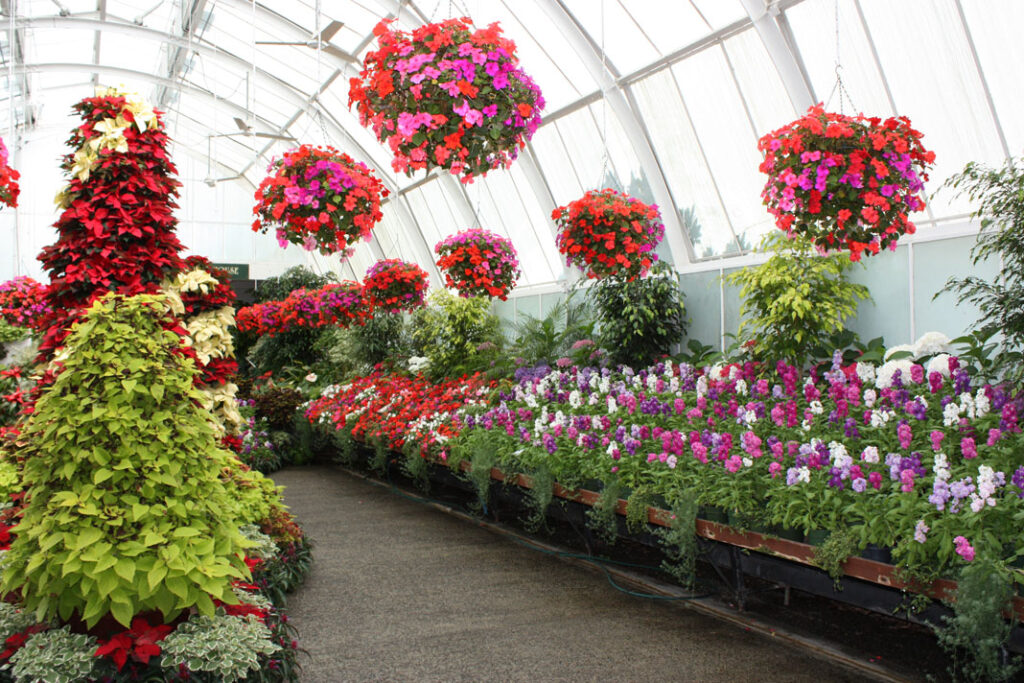
A beautiful display of healthy indoor flowering plant
Using eggshells as organic pest control is cheap and easy. The eggshell powder offers protection against hard-shelled flea beetles and Japanese beetles. The crushed eggshells act as bits of small glasses and make cuts in the insect bodies, thus injuring and killing them.
This article will discuss using eggshells as organic pest control, grinding them into a fine powder, and storing them for later use.
Eggshells as Organic Pest Control: What Are They?
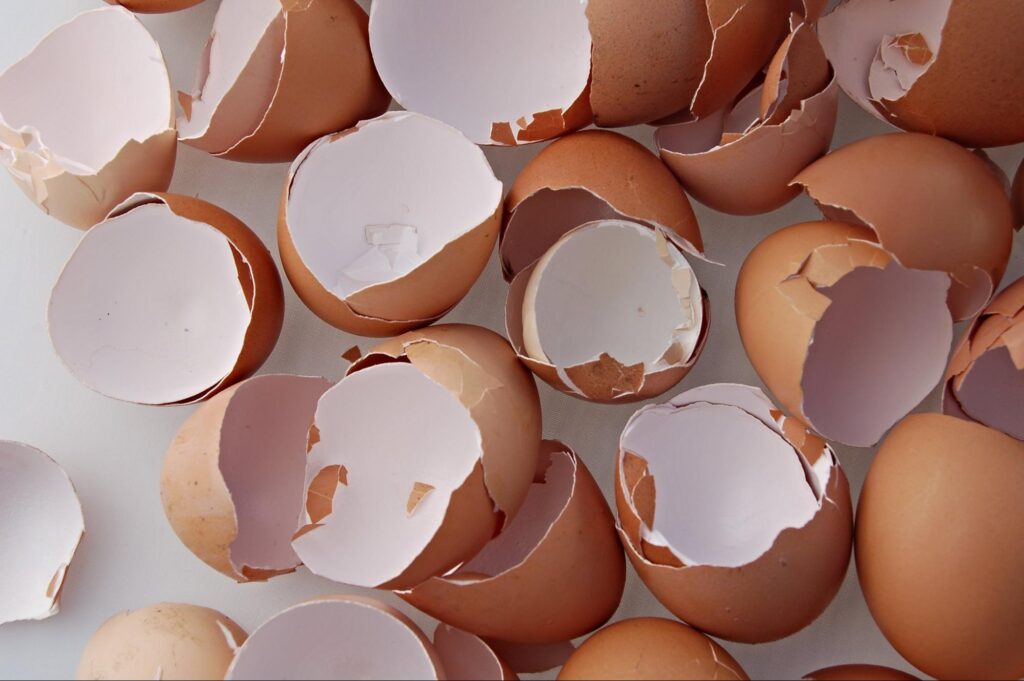
Eggshells—an incredible source of calcium for animals and as fertilizer for plants
Eggs are the most nutritious food because they are full of proteins, vitamins, and minerals. While using the eggs, the eggshells are thrown away in fruit and vegetable waste bins. Many do not know the other excellent benefits of these shells. The commercial use of these eggshells includes organic fertilizer for plants and calcium sources for animals.
Eggshells are the outer covering of eggs and are rich in calcium contents and other minerals. These eggshells add calcium to the soil and help the indoor plants and gardens thrive. Moreover, these eggshells can be added to the compost pile for an extra boost of nutrients for the plant. Without these eggshells, plants will not grow faster.
Eggshells prevent blossom end rot in tomato plants and squash. They help plants to build cell walls and promote plant growth.
Eggshells in Compost As Fertilizer for Plants
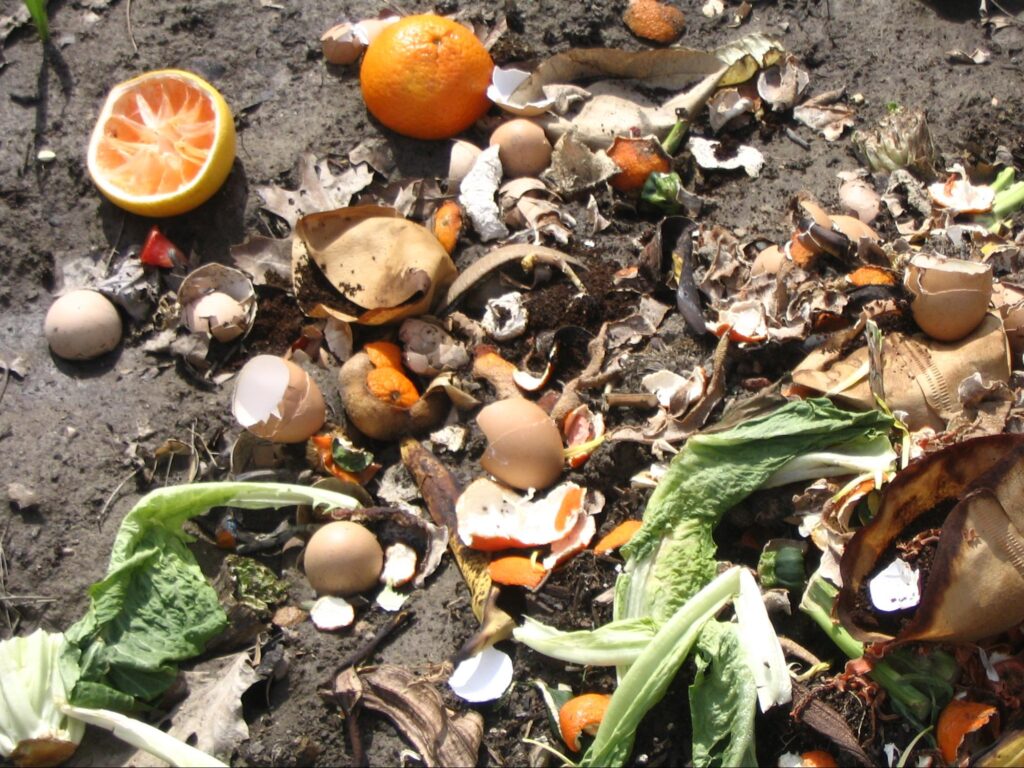
Add eggshells to your compost bin to boost the calcium levels as fertilizer for plants
Eggshells are a rich source of calcium (Ca), and adding them to compost would be a win for indoor plant owners and gardeners because it will add calcium to the compost and indirectly help plants as cell wall building blocks.
The calcium nutrient in eggshells will help tomato and squash plants and prevent them from developing blossom end rot. When there is not enough calcium in the soil, these two vegetables get the most impact on cell wall building.
You can add eggshells directly to the compost pile (it will take more time to break down and release calcium) or crush eggshells, then add them to the compost pile. It will speed up the decomposition process and quickly release calcium into the compost.
Note: Before putting the eggshells in the compost pile, wash them thoroughly to avoid the risk of disease that raw eggs may pose.
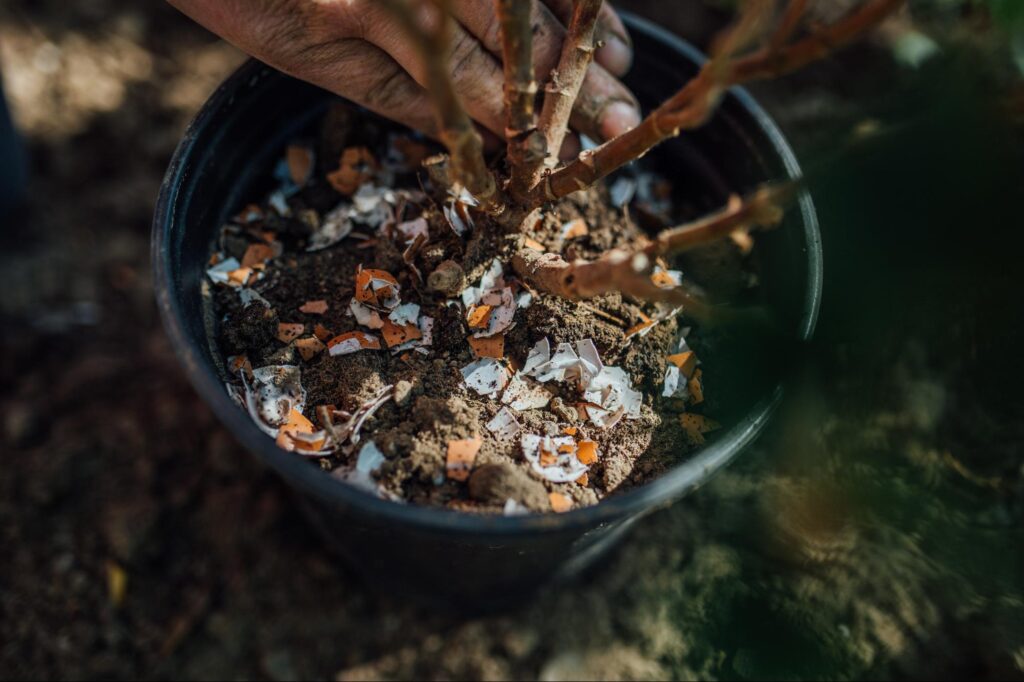
A close-up of a gardener directly putting the eggshells on the soil surface as a fertilizer for the flowering plant.
RELATED: Potassium for Houseplants: How to Use It for Happier and Healthy Plants?
Eggshells in Soil
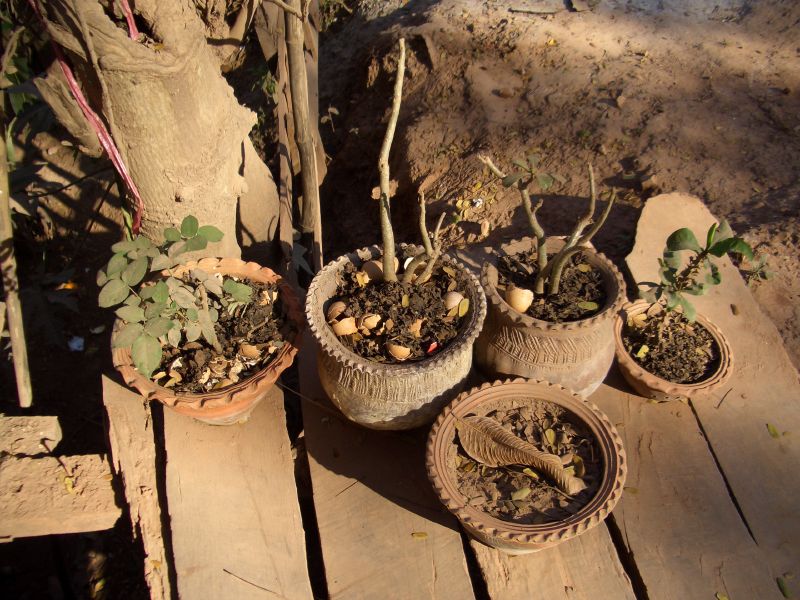
Eggshells in plant pots to add long term calcium nutrients to the soil
Eggshells can directly be added to the soil to improve nutrient levels and microbe health. The addition of eggshells to the earth will protect the vegetable crops from pests with coffee grounds.
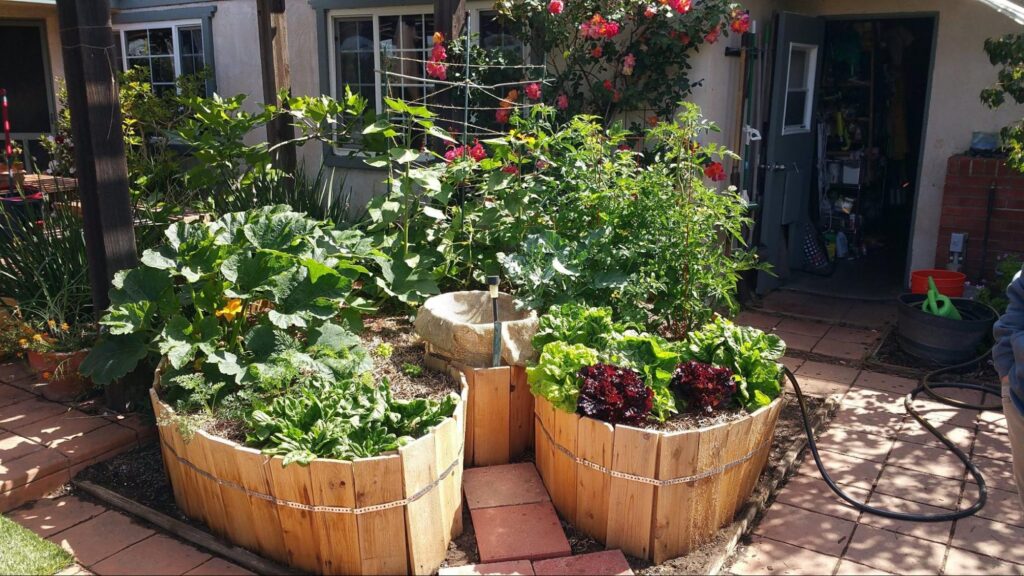
An outdoor vegetable garden is healthy and happy due to the regular application of coffee grounds and ground eggshells.
Eggshells as Organic Pest Control
Eggshells can be used as an organic pest control like diatomaceous earth (organic pesticide derived from fossilized remains of algae). They can work wonderfully on all kinds of garden insect pests, but for beetles and slugs, eggshells kill them. The ground eggshells act as bits of glass and pierce their bodies when slugs and snails slink across them.
Using eggshells as organic pest control is a great way to control garden pests in a promising and organic way. Moreover, it will ensure the leftover organic eggshells are appropriately used to benefit the garden and plants.
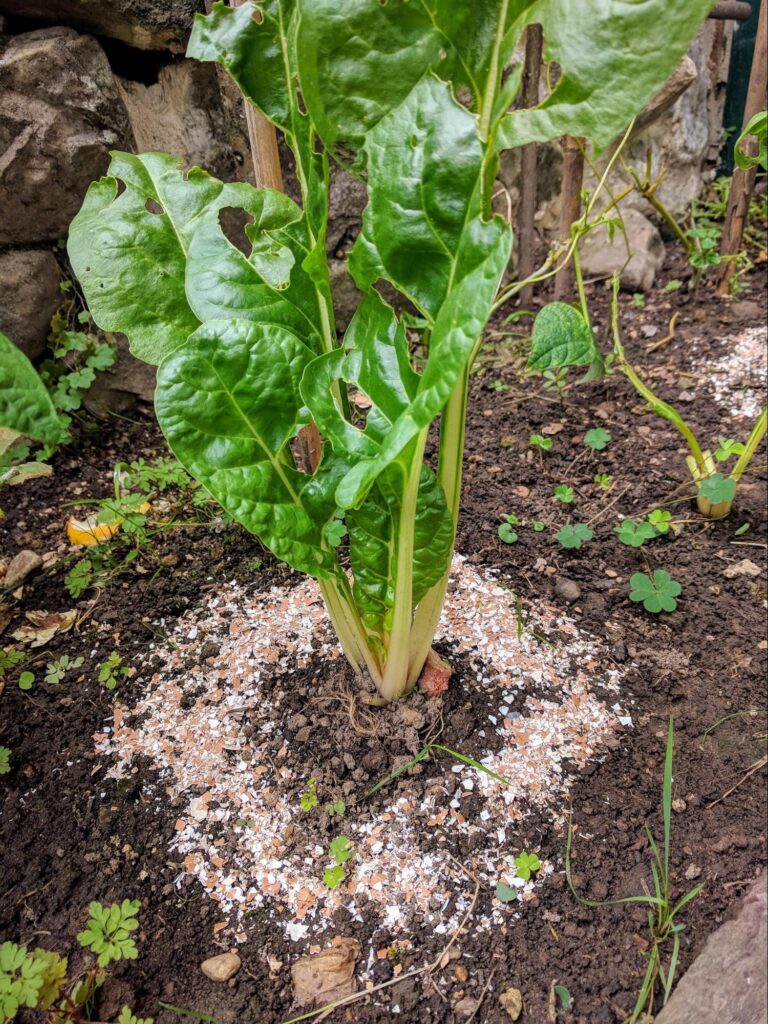
Crushed eggshells around chard as a defense against garden slugs and snails Photo Credit
RELATED: Nitrogen for Houseplants: Why is It Important for Growth and Reproduction of Plants?
How to Make Organic Eggshell Powder Directly from Leftover Eggshells?
Making organic eggshell powder is easy and simple and can benefit the growers for an extended period. Here are the steps to follow to make the best ready to use eggshell powder;
Clean Eggshells
Rinse the eggshells thoroughly to remove any leftover materials.
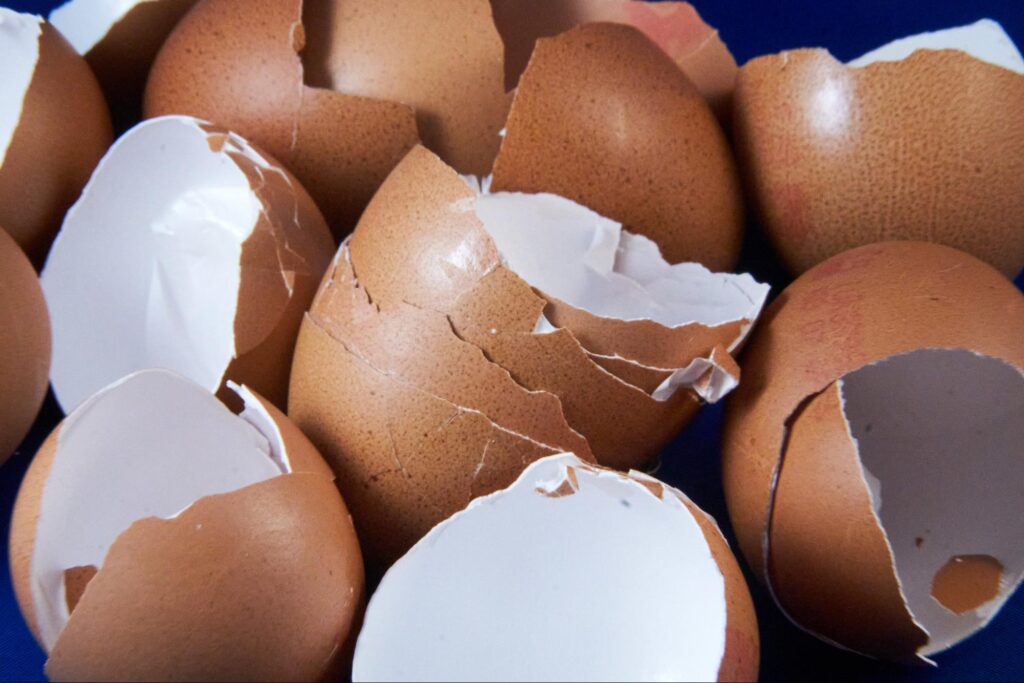
Clean and dried eggshells for the preparation of organic homemade powder
Dry the Eggshells
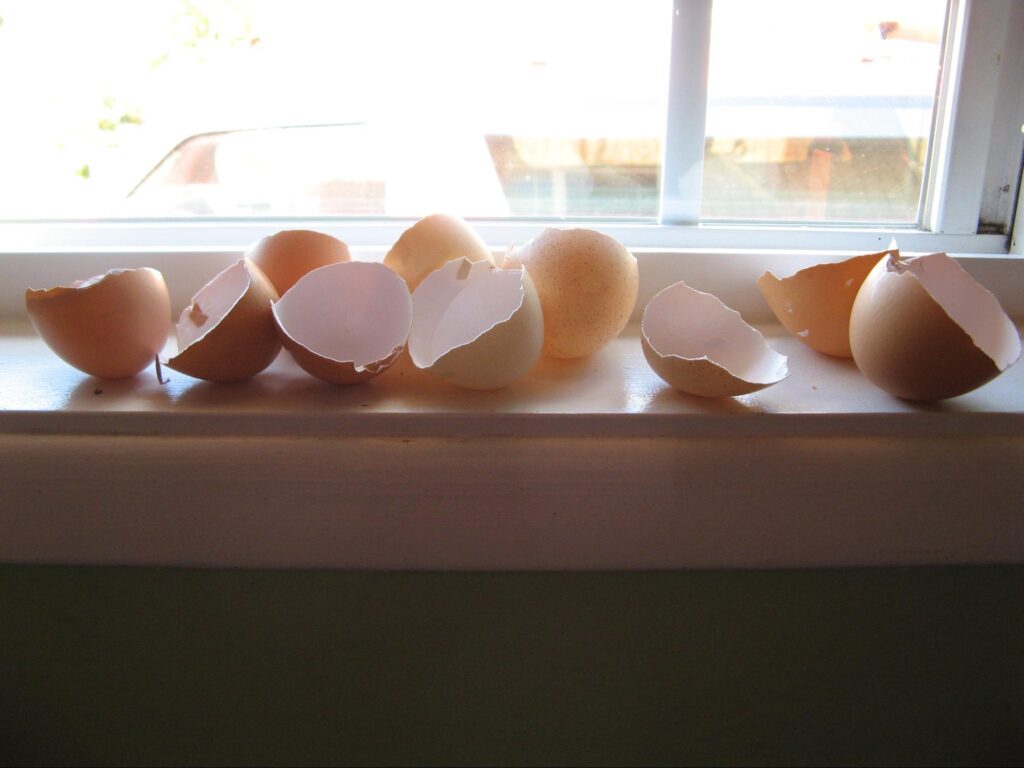
Drying of eggshells
After washing the eggshells, dry them in a paper bag or towel. The crucial step is to spread them, not stack them on the paper bag. Do not stack them; otherwise, they will mold and eggshell powder stinking smell.
Note: The other way to dry eggshells is by putting them in the oven at 180F for twenty minutes. It will entirely and neatly dry the eggshells.
Grind the Eggshells
Once you have done washing and drying eggshells, the next step is to crush or grind them. After drying, the eggshells would be a little brittle, and the best way is to put them in a mini food processor to grind eggshells. These can be crushed with a pestle and mortar.
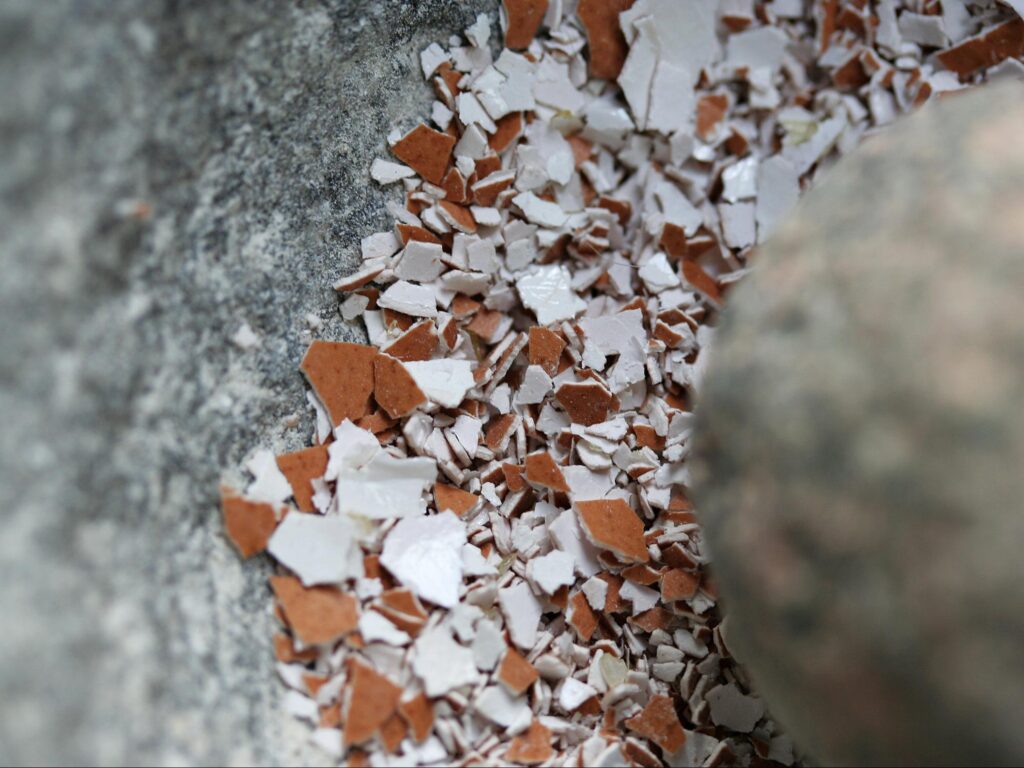
Eggshell powder with the help of a pestle and mortar
After crushing eggshells with a pestle and mortar, put them in a mini food processor to achieve the fine powder.
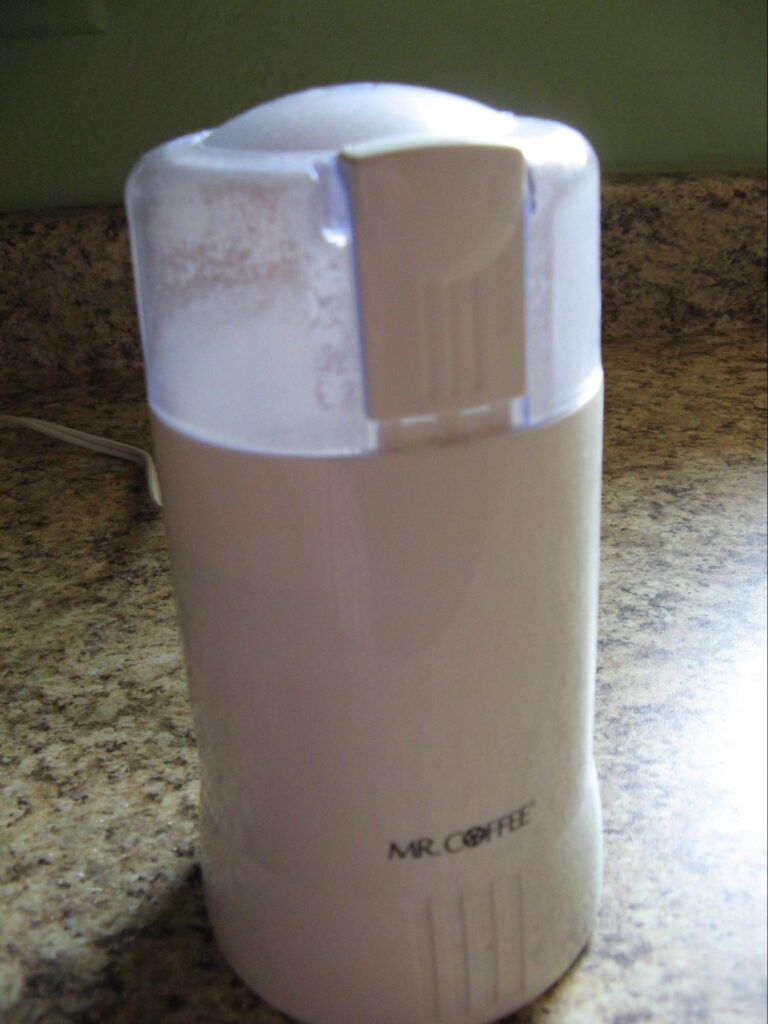
Place the crushed eggshells into a mini food processor for fine grinding
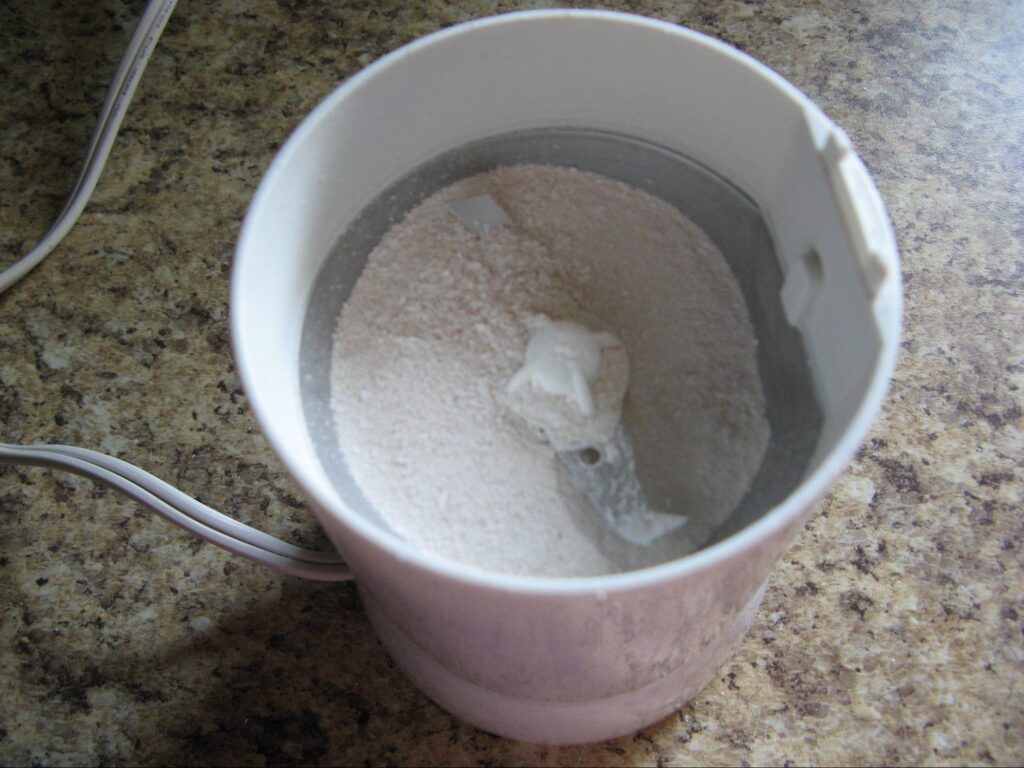
The fine eggshell powder for pest control
Application of Eggshell Powder as Organic Pest Control
This eggshell powder has multiple uses. You can apply it directly to the soil to battle the uninvited garden guests—slugs, snails, and beetles. The other way of their use is to sprinkle over plant leaf surfaces to create a protective covering for pest control. Reapply it after heavy rain to ensure constant protection from garden pests.
Note: Store unused eggshell powder for later use in a dry location.
RELATED: Calcium for Houseplants: Why is It Important for Growth and Reproduction?
Other Amazing Benefits of Eggshells
Eggshells have versatile uses. They work wonderfully as organic pest control when applied on leaf surfaces and soil. Furthermore, they also have other excellent benefits, and these are;
- Eggshells, as bird food, provide an incredible calcium source to females because they need more calcium before and after egg laying. Sterilize and grind eggshells, then mix them with bird food to make them available.
- Use the eggshells as a seed starter. Eggshells make a perfect mini seed starter because they are bio-degradable. First, sterilize the deep half eggshells, then make a hole with the finger at the bottom of the shell for good drainage. Add moist soil and seeds. When a seed germinates and sprouts appear, transfer them to a bigger pot with a good potting soil mix.
- Eggshells can repel uninvited visitors such as cats and dogs. Even deer dislike the smell of eggshells and stay away from the garden. Be careful when using eggshell powder as a repellant because it may attract vermin that munch on eggshells.
FAQs
How Do Eggshells Keep Pests Away?
Eggshells keep the unpleasant garden pests away by working similarly to diatomaceous earth. They act as bits of glass when insects cross over the crushed eggshells. It punctures their bodies, deprives them of their typical bodily functions, and kills them.
Why Should You not Throw Away Eggshells?
One should not throw away eggshells because they have tremendous benefits, such as;
- Add them to your compost pile because they will add an extra calcium boost.
- Make your coffee tastier by adding the fine powder of eggshells while brewing it.
- Eggshells have double functions. Add them to your potting mix to improve the soil structure, nutrition, and texture. Healthy soil will ultimately make your plant happy.
- Use these eggshells to repel garden pests, birds, and animals.
Do Eggshells Keep Caterpillars Away?
The best way to get rid of caterpillars is by handpicking them or spraying your vegetables with neem oil and insecticidal soap sprays. Eggshells will not do much to caterpillars because they undergo many life stages (egg, larval, pupal stage, and transitioned to adult moth). Therefore, eggshells will not affect or kill the caterpillars. However, they effectively destroy the garden beetles and slugs.
What Animals Are Attracted to Eggshells?
Eggshells attract birds that are beneficial to garden soil. To attract these birds, add crushed eggshells into their seed feed. It will attract females who need an ample supply of calcium after laying eggs.
How Long Does it Take for Eggshells to Decompose?
Eggshells take three years to decompose if they are roughly crushed. Otherwise, these eggshells easily break down in acidic soil while finely ground.
Do Eggshells Keep Ants Away?
Yes, eggshells keep the ants away and act as a natural repellant and pesticide to kill many garden pests. Place finely ground eggshells in places where ants always appear to keep the ants away from your garden and home area. Or spread over the garden soil or around plants at the base to injure the insect body.
Are Eggshells Good for Tomato Plants?
Despite their role as organic pest control, eggshells also provide abundant nutrients to the soil and plants. They add potassium, calcium, and phosphorus to soil and plant, which help tomato plants with their fruit production. Also, eggshells improve the tomato plant’s health and assist in fighting diseases and pests.
How Do You Make Calcium Spray for Plants?
Eggshells are a great source of calcium. To prepare a calcium spray for plants with eggshells, boil the 20 eggshells per gallon of water. Let it rest for a few hours, and strain the mixture. Pour the calcium water into the spray bottle and sprinkle it over your plants.
How Do You Make Eggshell Fertilizer with Vinegar?
To prepare the eggshell fertilizer with vinegar;
- Clean and crush the eggshells
- Soak the eggshells in vinegar for four weeks (for every one part of the eggshells, take nine parts of vinegar).
- After four weeks of soaking, the eggshell fertilizer is ready for your plants.
Sources for Further Reading
- Enroth, C. (2018b, March 28). Using Eggshells in the Garden and Compost. University of Illinois Extension. Retrieved May 29, 2022, from https://extension.illinois.edu/blogs/good-growing/2018-03-28-using-eggshells-garden-and-compost
- Holmes, J., & Kassel, P. (2006). Can ground eggshells be used as a liming source?.https://dr.lib.iastate.edu/handle/20.500.12876/36920
- Holmes, J. D., Sawyer, J. E., Kassel, P., & Diaz, D. R. (2011). Using ground eggshells as a liming material in corn and soybean production. Crop Management, 10(1), 1-12. https://doi.org/10.1094/CM-2011-1129-01-RS
Editor’s Recommendations
What are the Effective Ways to Fix Nitrogen Toxicity in Houseplants?
Growing Through Song: How Music Can Affect the Growth of a Plant







